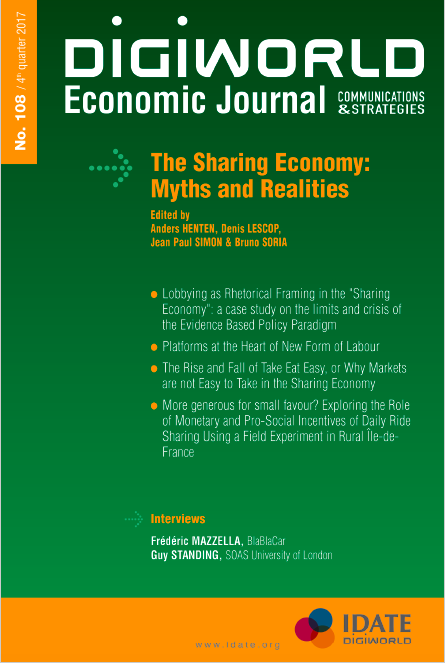Citation: P. Belleflamme and N. Neysen, The Rise and Fall of Take Eat Easy, or Why Markets are not Easy to Take in the Sharing Economy, in Digiworld Economic Journal (Communications & Strategies), no. 108 (4th Quarter, 2017), 59-76.
Abstract: We examine the reasons behind the rise and fall of Take Eat Easy, a Belgian home food delivery platform, in order to understand better the competitive dynamics that are at play in the sharing economy. We start by describing the home food delivery market in Europe and by summarizing the key milestones in the short existence of Take Eat Easy. We propose next a brief review of what the economic literature on digital platforms teaches us about what they do and how they compete. On that basis, we analyse more deeply the strategic choices taken by the leadership of Take Eat Easy, and their implications. Finally, we combine the two previous analyses to question the sustainability of the current business model of platforms in the sharing economy.
Paul Belleflamme and Nicolas Neysen have recently contributed to the special number on “The Sharing Economy: Myths and Realities” of DIGIWORLD Economic Journal (no. 18, 2017).
Their article “The Rise and Fall of Take Eat Easy, or Why Markets are not Easy to Take in the Sharing Economy” traces the evolutionary path of Take Eat Easy, a popular Belgian home food delivery platform failed in 2016. After having reconstructed the framework of the home food delivery market in Europe, the authors identify the possible factors that have led to the end of the Take Eat Easy experience.
Taking such a platform as a case study, the paper therefore questions the sustainability of the business models operating the sharing economy. In particular, the authors underlined how the success of these models may crucially depend on the efficient use of the data collected:
“Participants and transactions do indeed generate massive flows of data, which platforms can use to improve the relevance of the algorithms on which are based their reputation or recommendation systems, or to optimize the logistics of their operations as in the case of Take Eat Easy. As the cofounder said (see ROOSE, 2016), “to optimize courier utilization, our Technology & Operations team focused their efforts on automatic optimization and dispatching of orders, analytics-based capacity planning, and deep integration with the restaurants’ operations” which platforms can use to improve the relevance of the algorithms on which are based their reputation or recommendation systems, or to optimize the logistics of their operations as in the case of Take Eat Easy” (Belleflamme and Neysen, p. 65).
Indeed, the processing of data (personal and not) is a core feature in the business model of sharing economy platforms, either they provide the underlying service or act as “mere” intermediaries. The control over the data generated or gathered by the platform raises several issues also from a legal point of view: not only with reference to competition law, data protection, and intellectual property, but also to consumer law. In fact, the European legislator has started to recognise users’ data as a commodity (a “counter-performance”) in the proposal for the Digital content directive and the New Deal for consumers. It is a challenging and dynamic context, where further research is needed if we want to understand how the legal factors can take a role in the long-term success of platforms’ business models.
